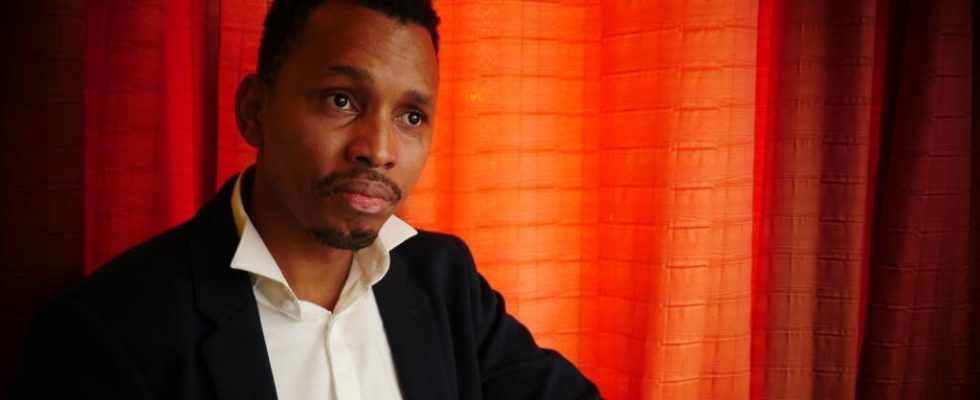From Guinea to Strasbourg, Thierno A. Balde spent nearly ten years on the traumatic road to exile. After having suffered violence, slavery, prison and close to death during a shipwreck in the Mediterranean, he tells the reality of migration.
5 mins
“ I don’t plan on going anywhere “. These words may seem banal, they take on a particular meaning when pronounced by Thierno Balde, he who spent a major part of his life in “ go again, always move forward “, because “ there were no other options “. Based in Strasbourg, this 26-year-old young man with a finely trimmed mustache and goatee works as a pastry chef in a supermarket and is also taking law courses. Two months ago, he married Julie. Since they met in Strasbourg a little over a year ago, the two have shared their lives. Today, Mr. Balde is “ a reconstructed man ”, as he proudly says.
But before getting there, he had to overcome countless obstacles since leaving the Guinea in 2013. At the time, his life oscillated between the capital, Conakry, and the village where he lived with his mother and many siblings in the Fouta region in the center of the country. His father, involved in the political opposition, is presumed dead since the massacre of September 28, 2009when the repression of a meeting in a stadium in Conakry left more than 150 dead.
Following in his father’s footsteps, his political commitment earned Thierno A. Balde time in and out of prison. “ I was an angry person who had been influenced by politicians. We barricaded ourselves, we set fire to everything we could. I found myself in prison several times. At one point I was hurting my family more than anything else because they were spending their savings to free me, until one day when I came out I was told to leave because otherwise the next times, it would be imprisonment too many “, he says.
“ You are not going into the sea »
Supported by his mother, who had forbidden him from making the trip to Europe, he therefore took the road to neighboring Mali where he stayed for a while with his aunt. But seeing no prospects in Bamako, he decided, without saying anything to anyone, to follow “ a flood of people » who were heading to Algeria, where rumor had it that sub-Saharan Africans were wanted for work in construction sites.
It was at this time, in 2013, that he informed his family that he was leaving. “‘You are not going into the sea,’ my mother told me “. Thus begins the long story of the crossing. At that time, Thierno was 15 years old: “ I built myself on the road “. He will spend eight years crossing deserts, cities and seas… Eight years during which he will have to face violence, racketeering, rape, imprisonment, slavery and even death. And from this journey “ littered with horrors », he concedes, he made a book from it: Europe calls, Africa cries – A one-way trip (Éditions L’Harmattan).
“ Move forward and stop living in the past »
It was after his arrival on the Italian island of Lampedusa and the sinking of his boat in the open sea that he began to write his story. “ The most terrifying moment of my life without hesitation. Far beyond the prison in Libya or other horrors », Testifies Thierno Balde.
Read alsoShipwrecks in the Mediterranean: migrants facing a fortress Europe
Starting out as simple snippets of a trip tapped on his phone, this story gradually becomes a complex story. A reflection of his identity and also a way, for him, to overcome trauma. “ It freed me. While writing, I felt like I was speaking. It’s as if there was someone next to me listening to me. It’s truly something liberating », says the man who discovered a passion for writing.
With a determined temperament, the young man now wants “ move forward and no longer live in the past “. But he also wants to help, faithful to the values that have been instilled in him. Thus, he publishes this work with one goal: to inform about the life of migrants, what pushes them to take the road and what they endure during the journey. “ When I arrived in Europe, in the middle of the migration crisis, I saw a lot of people on TV talking about us, but they very often said nonsense. », he regrets.
A one-way trip?
And above all, he wants to warn the other suitors of the trip. “ I want others to know that if they decide to leave, the journey will not be a cakewalk. They need to understand what they are going to endure and make this decision with full knowledge of the facts. », he testifies, hoping one day, always thinking bigger, to market his book in Africa.
And after having braved all these dangers to leave the continent, would Thierno make his future there? “ It’s a possibility », he believes today, he who finally sees a future ahead of him.
He also returned once for ten days to his country. “ I was ashamed when I saw my mother again », he says during this short return to Guinea. And to add: “ Shame for putting him through all this “.
After all these years, he has not lost his rage to fight against injustices, just put his anger aside. With his law degree, he would almost think of practicing in Guinea. “ I went to prison for doing nothing and I know many others have been in this situation. People deserve to have legal help and be told what their rights are “.
